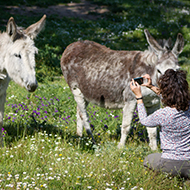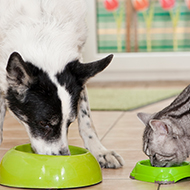Glasgow University looks at developing artificial formula
While the UK waits in anticipation for the possible birth of a panda cub - or two - at Edinburgh Zoo, the University of Glasgow is working on developing an artificial milk formula.
Panda cubs are dependent on their mother's first milk, or "colostrum", which contains essential nutrients and antibodies to help with their development and protect them from infection.
If two cubs are born, however, the mother will reject one so that she can give all her attention and milk to the other.
Similarly, pandas are not always comfortable with being bred in captivity and will sometimes reject or even kill their own babies if they become stressed.
Under these circumstances, zoo keepers will intervene, which is why conservationists in China have sought the help of scientists from the University of Glasgow in developing an artificial milk formula.
Led by Professor Malcolm Kennedy, of the university's School of Life Sciences, a team of researchers is using state-of-the-art equipment to identify the proteins and other molecules that make up panda colustrum, as well as the mature milk.
It is hoped that understanding the differences in composition between panda milk and human and dairy milk could aid the development of a formula to support baby pandas.
Prof Kennedy explains: "We’re investigating the lactation period from birth to about 150 days. When we look at how levels of different proteins change during panda lactation, we find that these molecules change unexpectedly slowly compared to other placental mammals.
"Also, certain small molecules that include essential nutrients are produced in large amounts at first, then fade away, while some are produced constantly, and others appear later."
While researchers say they are still a long way from creating a milk substitute for panda cubs, the data being gathered will "set us in the right direction."
Prof. Kennedy will be addressing the three-day Giant Panda Research Symposium, hosted by Edinburgh Zoo on September 10-12.






 RCVS Knowledge has called on vet practices to audit their post-operative neutering outcomes.
RCVS Knowledge has called on vet practices to audit their post-operative neutering outcomes.
